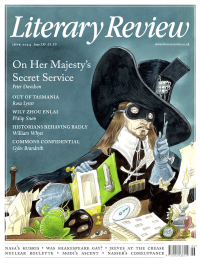Andrew Crumey
The Final Countdown
Challenger: A True Story of Heroism and Disaster on the Edge of Space
By Adam Higginbotham
Viking 576pp £25
On the morning of 28 January 1986, the Space Shuttle Challenger exploded soon after launch, killing its seven-member crew, which included the world’s first ‘citizen astronaut’, schoolteacher Christa McAuliffe. Viewed live on television across America, the disaster was a national trauma that drew comparisons with the Kennedy assassination. A subsequent inquiry exposed a shocking catalogue of avoidable errors. Adam Higginbotham’s account of the tragedy is detailed and enthralling.
Like the spacecraft used in the Apollo moon missions, the Space Shuttle had its origins in Nazi Germany. Among the many German rocket scientists brought to the United States after the Second World War were Wernher von Braun and Walter Dornberger. Braun was the brains behind the German V-2 and used his knowledge to develop NASA’s Saturn V rocket. Dornberg, meanwhile, fed Nazi plans for a rocket plane into the programme to build a hypersonic military aircraft called the Dyna-Soar. The Dyna-Soar was never constructed but the project paved the way for the Space Shuttle. Developed during the 1970s, the Space Shuttle became NASA’s answer to public outrage over the cost of the Apollo programme. The reusable orbiter would, it was promised, make spaceflight as economical, safe and routine as commercial flight. The reality was different.
The Space Shuttle programme was complex – the ‘Cast of Characters’ Higginbotham supplies is essential for keeping track of who’s who. That complexity underpinned the disaster. Multiple facilities and contractors, civilian and military, were tasked with designing, building and operating the Space Shuttle. All were tightly constrained by budget and

Sign Up to our newsletter
Receive free articles, highlights from the archive, news, details of prizes, and much more.@Lit_Review
Follow Literary Review on Twitter
Twitter Feed
Richard Flanagan's Question 7 is this year's winner of the @BGPrize.
In her review from our June issue, @rosalyster delves into Tasmania, nuclear physics, romance and Chekhov.
Rosa Lyster - Kiss of Death
Rosa Lyster: Kiss of Death - Question 7 by Richard Flanagan
literaryreview.co.uk
‘At times, Orbital feels almost like a long poem.’
@sam3reynolds on Samantha Harvey’s Orbital, the winner of this year’s @TheBookerPrizes
Sam Reynolds - Islands in the Sky
Sam Reynolds: Islands in the Sky - Orbital by Samantha Harvey
literaryreview.co.uk
Nick Harkaway, John le Carré's son, has gone back to the 1960s with a new novel featuring his father's anti-hero, George Smiley.
But is this the missing link in le Carré’s oeuvre, asks @ddguttenplan, or is there something awry?
D D Guttenplan - Smiley Redux
D D Guttenplan: Smiley Redux - Karla’s Choice by Nick Harkaway
literaryreview.co.uk